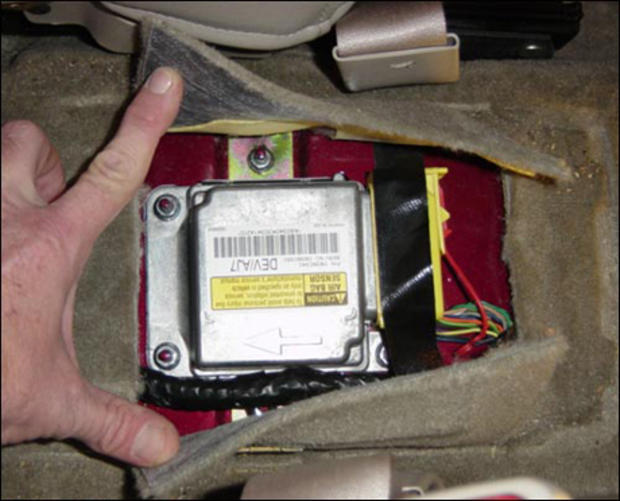How your new car knows ALL of your secrets, and why it's ready to "out" you.
I am not a paranoid guy. Really, I'm not.
But what is happening under the front seat of my late-model sport-utility vehicle has me questioning whether or not I live in a country where the protection of civil liberties is still guaranteed by the Constitution.
What I have is called on-board data collection. And if you own a newer car, truck or SUV, chances are that your vehicle is spying on you. The automotive technology is actually very simple, and similar to the "black boxes" used on commercial aircraft. Typically situated under the driver's seat, the recorders installed on motor vehicles are designed to take what amounts to a snapshot of your driving habits and patterns just prior to a collision. And it's this snapshot that could ultimately become your worst enemy if you are involved in an accident.
Here's how it works: The instant your vehicle's computer recognizes that the air bag has deployed, the data recorder permanently locks in information about what was occurring just prior to the collision. The information can include your vehicle speed, whether you used the brakes, the engine revs, the gear that the transmission was in, the rate of deceleration and whether you or your passengers were wearing seat belts.
So what's the problem, you ask? Well, there's the fact that this information rarely is retained by the driver or the owner of the vehicle, but insurance companies and law enforcement can download this data from vehicles that have been towed to wrecking yards or impound lots.
Once quantified, the collected data can be used to help determine fault in an accident. Or it might be the basis to re-evaluate your risk category as an insured driver. General Motors Corp., Ford Motor Co., Honda and Toyota freely admit to installing these recorders, but other automakers have been less forthcoming about technology they are installing to capture driving habits and conditions.
The big question remains: Is all of this legal? Like most things that are new and controversial, there's a lot of debate but no concrete answer. The courts are wrestling with the issue, but in-vehicle data has been cited as evidence against American drivers in legal proceedings. Call it the ultimate automotive betrayal.
However, there are those who firmly support on-board data collection. They say it provides accurate crash data as opposed to speculation from drivers and eyewitnesses. And they insist that motorists who have done nothing wrong in a crash have nothing to worry about.
So what to do? I believe it boils down to the issue of ownership. You own the vehicle, and in my opinion, you should own any and all information captured as a result of your driving it. This means that you need to protect that recorder no matter what!
If your car is involved in a collision, I would first deny anyone access to the vehicle for the purpose of downloading any on-board data. Make your desire clear to the impound lot or wrecking yard. If possible, immediately have a mechanic remove the device and keep it in a safe place. Obviously, if you are served with a warrant or a subpoena, you may be asked to surrender the recorder, although experts tell me that rarely has been the case.
My next step would be to consult a good attorney who is familiar with what ownership rights you may have with respect to the data in the recorder. In some cases, of course, the data could actually help you in a legal dispute by proving you were not at fault. But from my perspective, it should be your choice whether to make this information public. Or until the courts offer a definitive ruling on this new technology, you should at least have the right to argue that disclosure is your choice.
If the recorders seem too Big Brother to you, I think you're right on target. We live in an era where personal privacy is eroding at an alarming rate - much of that the result of electronic technology - and on-board recorders are just another example of this erosion. And what happens when you are alone in your car should be very private.
In case you're wondering, there is little you can do to disconnect these high-tech stool pigeons. In some cases, you could actually harm the vehicle trying to remove them. So in lieu of ripping the things out, you should at least be aware of their existence and attempt to maintain control of them to the greatest extent possible.
America's Founding Fathers believed in the right of privacy, even though they never dreamed of the motor vehicle. Driving is a privilege, but is it too much to expect privacy while exercising that privilege? I say no.
-------------------------------------
Doug Brauner is the owner/operator of The Car Czar chain of auto repair facilities.
Doug is also the host of DRIVE, now seen on the Discovery Network, and can be seen weekly on Good Day Sacramento.
Please visit www.thecarczar.com for contact information.
